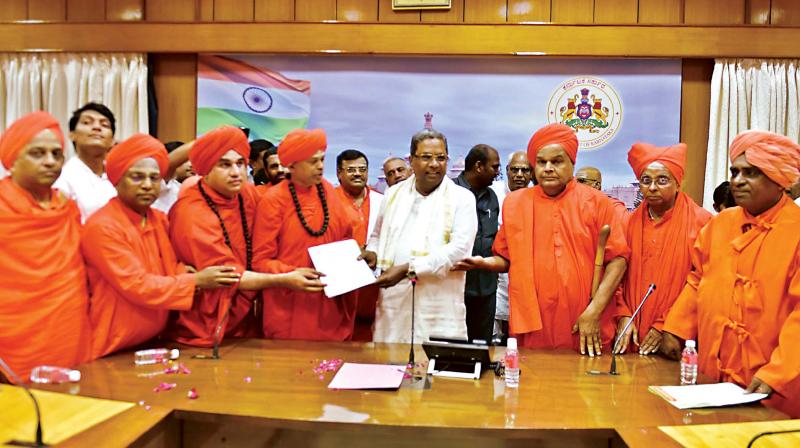What does RELIGION means for you? Forget Religion, Become A Seer!

TOI Editorial Page,Spirituality
By Jug Suraiya
September 13, 2018
Note: Words like Religion, spirituality, faith, God etc are creating a great confusion in the minds of simple people. Jug Suraiya throws some light on what It is all what?
All do not mean the same, but all have their roots in the word ‘Religion’ which means ‘binding together’ vertically and horizontally; vertically with God above or indwelling in us and the universe. This vertical binding should automatically result in one’s binding together horizontally with one’s brothers and sisters in the whole world. This is true spirituality.
When the horizontal external binding together is limited to a small or big group only, based on their Faith or belief systems propounded by various so-called god-men, we have what are called compartmentalized Organized Religions like Christianity, Hinduism, Islam etc.
Some of them like Christianity and Islam are strictly and centrally organized, while Hinduism is loosely or liberally organized allowing room even for agnostics, unbeliever and atheists. Hence the recent phenomenon of opposition or hatred for all organized religions and the growth of NONES, or those who refuse to be card carrying members of any established religions, often fighting among themselves for superiority like the Pharisee prying in the temple.
In Popular Parlance
In popular parlance only those who believe in a God, prophet or sacred book are strictly called religions. The rest are various secular, socio-political groups like communism, socialism, capitalism or rationalism, all based on certain strongly held philosophical ideology. What is essential for peace, progress, well-being and happiness of all is the bonding of the whole of humanity through the live wire called fraternity of love and care seen only in a closely knit family.
“A religious sect is like an army which derives its strength from enforcing discipline to ensure that all its recruits learn to march in step with each other.”All organized religions, big or small, are business ventures with their own enticing rituals for earthly or heavenly rewards for a pay.
Start-up called ‘Cattle Class’
Competition in the market to sell one’s product results in enmity, conflict and violence leading even to the extermination of the other.The only way to liberate oneself from the prison of organized religion is to walk alone guided by the light divine within us, reason and commanding conscience propelled by “Satyagraha”, an irresistible love for the “Whole truth in all charity!”
Tagore sums it up in the phrase: “Akla cholo re, Walk alone” (creating one own ‘Start-up’) and what CCV defines as the life one in the CATTLE CLASS of Jesus where the completion is to become the ‘Little Ones’ volenterily and alone getting bonded with the last, least and lost to serve them, not to lord over, and then the better offs in society in ascending order.
Spirituality and religiosity and bonding with the downtrodden, as Jesus did, not bonding with organized religions where the comfortable class live, is the need of the hour. Bonding with the lowly is also the way to get connected(re-legare) horizontally with the whole of humanity and vertically with the divine spirit within all of us (when you did it the least, you did it to me). Opt to become truly religious by living the life of a Cattle Class at the bottom. james kottoor,editor, CCV.
Read below “Forget Religion, become a Seer” by Jug Suraiya
While reading a book – a gripping philosophical thriller which, among other things, discusses the roots of Judaism and Christianity – I came across the origin of the word ‘religion’.
It derives from the Latin ‘re ligere’, which translates as ‘to bind’. And that’s exactly what religion, any religion, including a crypto religion like Communism or Fascism, does: it binds individuals together so that they form a united group or community.
Socio biologists say that the reason religion thrives, and has done so over the ages, is that such binding together enhances the genetic survival of the group or community through its self-help dynamics: Individuals are more vulnerable than collectives.
The closer the bonding – the more rules, rites and rituals that a congregation shares, in the form of dietary habits and other day-to-day practices – the greater the genetic success of the community as a whole and its common identity as represented by a particular religion.
A religious sect is like an army which derives its strength from enforcing discipline to ensure that all its recruits learn to march in step with each other.
Like all competing products on the market, each religion promotes itself by establishing its own USP – its unique sales proposition – to differentiate it from other religious brands over which it implicitly or explicitly asserts its own superiority. The Oneness of any given religion is premised on the Otherness of all those who do not belong to it, who are outside the inner fold.
This Oneness/Otherness, Insider/Outsider dichotomy has been the source of murderous conflict in the long and blood-drenched history of religion, a tragic legacy which the world continues to inherit today.
This is the other meaning of the etymology of religion: ‘to bind’ also means to tie us, to shackle us, to totems and taboos which affirm our Oneness, and the adversarial Otherness of all who are not us.
How can one unbind oneself from the bondage of organised religion, to break out of the step-march of sectarianism? Rabindranath Tagore summed it up in a single phrase: Akla cholo re, Walk alone.What does it mean to walk alone, and how does one learn to do it?
It’s a risky enterprise, like turning your back on the safety and security of the family business you were born into, and embarking on your own startup venture.
To walk alone is exactly that: a startup venture of the spirit. Sans religion, the solitary walker embarks on a journey without maps signposting predetermined destinations, a voyage without any compass other than the lodestar of universal compassion, a sense of the Oneness which underlies all creation and needs no Otherness to define itself.
Call it ethical neo-atheism, or enlightened rationalism, or spiritual humanism. Better still don’t call it anything at all because all ‘isms’ end up becoming quasi-religious dogma. Shedding the blinkers of religion is the first step the solitary walker takes towards becoming a seer, one who sees.
Aldous Huxley called such seeing, the developing of an inner vision, the opening of the gateways of perception. Or as a mystic poet put it: “To see a world in a grain of sand/And a heaven in a wild flower/Hold infinity in the palm of your hand./ And eternity in an hour.”
(DISCLAIMER : Views expressed above are the author’s own.)

















